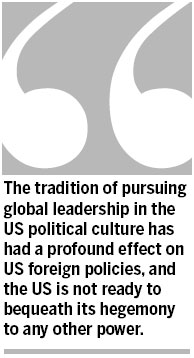Obama's global strategy
By Chen Jimin (China Daily) Updated: 2013-10-31 07:10This burden-sharing strategy is aimed at reducing the cost to the US of being the global leader and saving more resources for domestic economic development, so as to restore the US' vitality and strength.

The Obama administration has three main priorities for its global strategy: reducing its defense investment in Europe, stabilizing the Middle East, and strengthening its presence in the Asia-Pacific region.
According to the US Department of Defense's strategic guidelines, Sustaining US Global Leadership: Priorities for 21st Century Defense, released on Jan 5, 2012, "most European countries are now producers of security rather than consumers of it". The change in European attitudes toward security has provided the opportunity for the US to be less involved in Europe and switch its strategic focus, although this does not mean that the US will ignore the strategic importance of Europe.
The Middle East has traditionally been a critical region for US interests. Given its strategic importance and its nettlesome geopolitics, further complicated by the recent "Arab Spring", US strategy in the region has always been challenged. However, the Obama administration anticipates that its revamped strategy will help the US maintain its grip on the Middle East.
Meanwhile, the US' adjusted strategic focus on the Asia-Pacific region is a comprehensive rebalancing that incorporates diplomacy, economic and military aspects.
The tradition of pursuing global leadership in the US political culture has had a profound effect on US foreign policies, and the US is not ready to bequeath its hegemony to any other power. While it has had some ups and downs, the Obama administration is confident that the US is still the world's largest, most dynamic, promising and powerful state and believes the nation is the natural world leader.
In a speech at the UN General Assembly on Sept 24, Obama said that the US is "exceptional" and its retirement from the world stage would create "a vacuum of leadership that no other nation is ready to fill". This makes it clear that "American leadership" is indeed the motivation for the Obama administration's global strategy.
The author is an assistant research fellow for the Institute for International and Strategic Studies at the Party School. www.chinausfocus.com
(China Daily 10/31/2013 page8)











